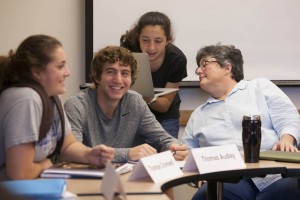
Mellon Foundation awards Bates $1 million to support innovations in learning and teaching

The grant will allow the college to take more advantage of faculty expertise to plan new directions in curriculum and teaching in the humanities.
Bates will launch a four-year initiative in the fall of 2013 to foster innovative approaches to teaching and research in the humanities, supported by a recently awarded $1 million grant from The Andrew W. Mellon Foundation.
The initiative will allow the college to take advantage of upcoming faculty retirements to approach innovations in curriculum and teaching in a strategic and thoughtful way.
Planning for the project will begin immediately, with two interconnected aspects:
• Appointment of six recent Ph.D. recipients in the humanities as postdoctoral fellows, for terms of two years each, to teach and conduct research. The appointees will be selected partly on the basis of their demonstrated commitment to innovation in the field.
• Release time from teaching duties for current faculty members to undertake enhanced reviews of six departments and programs, focusing on innovation and interdisciplinarity. The work of the postdoctoral fellows will help make the release time possible.
The fellowships and the enhanced reviews will coincide with phased faculty retirements to ensure that the departments and programs are taking advantage of a window of transition to forge new directions in curriculum and teaching.
“Simple demographics mean that we are on the verge of an unusually high number of faculty retirements at colleges and universities nationwide, and Bates is no exception, especially in the humanities,” said Bates President Clayton Spencer. “This Mellon grant will help us convert a potential challenge into an opportunity for our departments and programs to take advantage of the latest thinking in a range of fields to shape our curriculum for the next generation.”
Dean of the Faculty Pam Baker said, “Humanities departments and programs are part of the core of our liberal arts curriculum. This support for self-study and work with exciting young colleagues will put us in the strongest possible position to enhance our work in this area as we look ahead.”
Bates faculty members from across disciplines are already experimenting in teaching and conducting research in ways that enrich both the classroom experience and the campus community. And the college is actively exploring advances in a range of fields, including:
• the use of technology in the liberal arts setting;
• its extensive senior thesis program;
• the integration of theory and practice in scholarship and teaching; and
• pedagogical approaches that cross traditional curricular or disciplinary boundaries.




